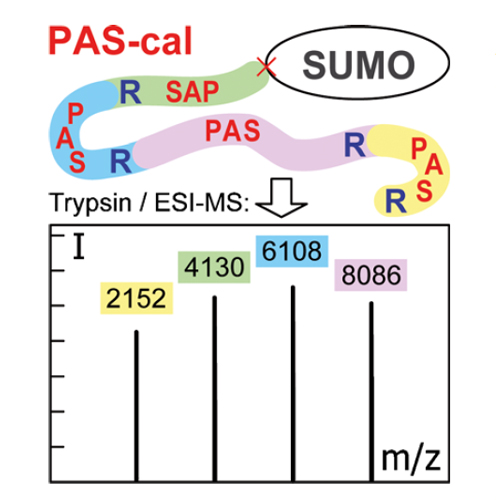PAS-cal: a Generic Recombinant Peptide Calibration Standard for Mass Spectrometry
28-May-2014
Journal of The American Society for Mass Spectrometry, 2014, DOI: 10.1007/s13361-014-0902-3, Volume 25, Issue 8, pp 1489-1497, published on 28.05.2014
Journal of The American Society for Mass Spectrometry, online article
Journal of The American Society for Mass Spectrometry, online article
We describe the design, preparation, and mass-spectrometric characterization of a new recombinant peptide calibration standard with uniform biophysical and ionization characteristics for mass spectrometry. “PAS-cal” is an artificial polypeptide concatamer of peptide cassettes with varying lengths, each composed of the three small, chemically stable amino acids Pro, Ala, and Ser, which are interspersed by Arg residues to allow site-specific cleavage with trypsin. PAS-cal is expressed at high yields in Escherichia coli as a Small Ubiquitin-like MOdifier (SUMO) fusion protein, which is easily purified and allows isolation of the PAS-cal moiety after SUMO protease cleavage. Upon subsequent in situ treatment with trypsin, the PAS-cal polypeptide yields a set of four defined homogeneous peptides in the range from 2 to 8 kDa with equal mass spacing. ESI-MS analysis revealed a conveniently interpretable raw spectrum, which after deconvolution resulted in a very simple pattern of four peaks with similar ionization signals. MALDI-MS analysis of a PAS-cal peptide mixture comprising both the intact polypeptide and its tryptic fragments revealed not only the four standard peptides but also the singly and doubly charged states of the intact concatamer as well as di- and trimeric adduct ion species between the peptides, thus augmenting the observable m/z range. The advantageous properties of PAS-cal are most likely a result of the strongly hydrophilic and conformationally disordered PEG-like properties of the PAS sequences. Therefore, PAS-cal offers an inexpensive and versatile recombinant peptide calibration standard for mass spectrometry in protein/peptide bioanalytics and proteomics research, the composition of which may be further adapted to fit individual needs.











